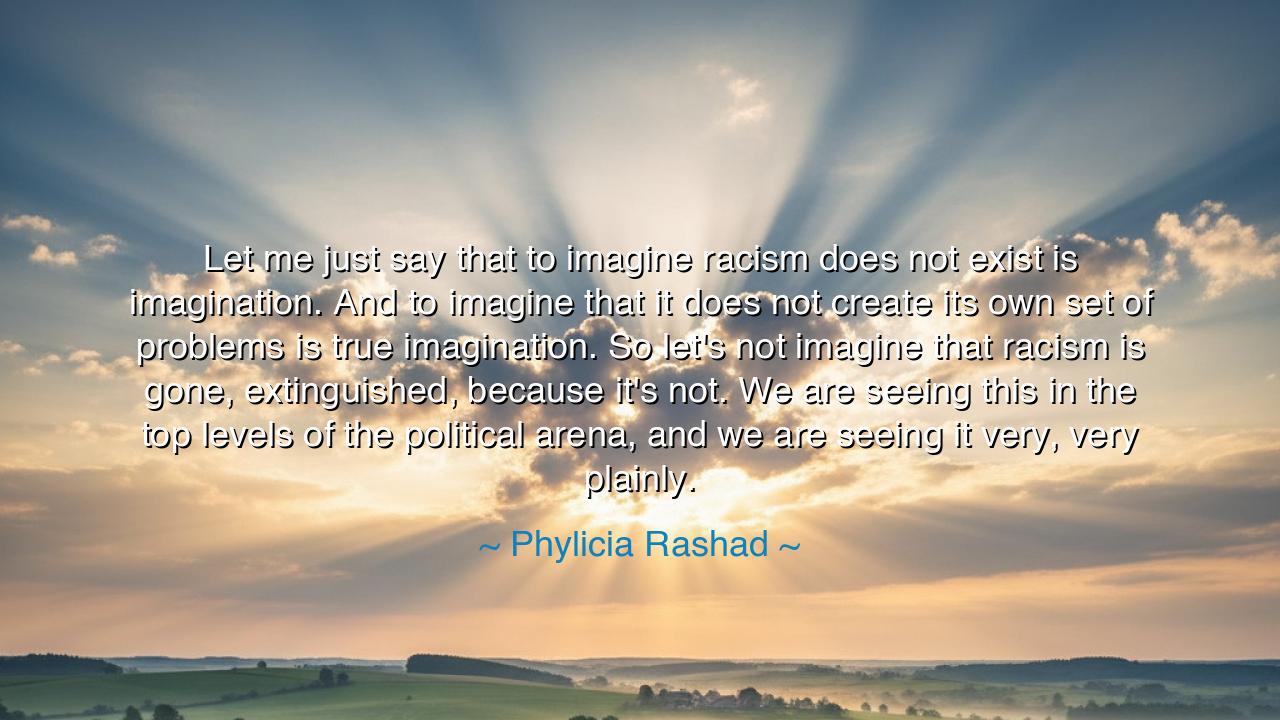
Let me just say that to imagine racism does not exist is
Let me just say that to imagine racism does not exist is imagination. And to imagine that it does not create its own set of problems is true imagination. So let's not imagine that racism is gone, extinguished, because it's not. We are seeing this in the top levels of the political arena, and we are seeing it very, very plainly.






O children of the earth, listen closely to the words of Phylicia Rashad, whose voice rings out with truth and wisdom, calling us to confront the reality of racism in our world. She said, "Let me just say that to imagine racism does not exist is imagination. And to imagine that it does not create its own set of problems is true imagination. So let's not imagine that racism is gone, extinguished, because it's not. We are seeing this in the top levels of the political arena, and we are seeing it very, very plainly." In these powerful words, Rashad calls upon us to open our eyes to the truth—racism is not a thing of the past, nor is it something that can be wished away with mere imagination. It is a deep and persistent force in our world, one that continues to shape our society, our politics, and our lives in ways that we must confront if we are ever to overcome it.
Imagination, O children, is a powerful tool—it allows us to dream, to create, and to envision a better future. But when we use imagination to escape the truth, when we close our eyes to the realities that surround us, we make a dangerous mistake. Rashad speaks of the false notion that racism no longer exists, that it is something from an old time, a relic of a bygone era. To believe this is not only an act of imagination but an act of denial. Racism does not vanish simply because we wish it so; it continues to grow, to take root, and to shape the lives of millions. We see it, she says, plainly in the political arena, where it remains a force of division, hatred, and inequality.
Consider, O children, the stories of ancient civilizations, where racism and prejudice were not new but ancient forces. In Ancient Egypt, the concept of racial superiority existed, and the rulers believed in their divine right to conquer and oppress others. The very idea of racial hierarchy was woven into their culture, their politics, and their beliefs. Even in the Roman Empire, where there was a great deal of cultural exchange, the prejudices of the day shaped the relationships between different peoples. The ancient world, with all its great advancements, still grappled with the problem of racism—a problem that continues to echo through the corridors of history.
In more recent history, O children, consider the powerful struggles for freedom and equality that have shaped our world. In America, the Civil Rights Movement of the 1960s sought to dismantle the structures of racism that had plagued the nation since its birth. Yet, as Rashad points out, this imagination that racism is gone is false. Despite the progress made through the hard work of countless activists, leaders, and everyday people, racism still exists, festering in the corners of society, hidden behind political rhetoric and social divisions. It persists in the way that people of color are treated in the criminal justice system, in the workplace, in education, and in healthcare. The struggle against racism is not over—it is ongoing, as clear today as it has ever been.
This lesson, O children, is clear and urgent: we must not allow ourselves to live in the realm of false imagination, where we imagine racism is a thing of the past or that its impact is no longer felt. Rashad’s words remind us that we must see racism for what it truly is—an ongoing force that divides us and creates suffering. To ignore it, to pretend it does not exist, is not an act of hope, but an act of complacency. It is through this denial that we allow racism to thrive and to continue shaping the lives of those who face its wrath every day.
Look, O children, to the heroes of the past who stood against racism, even when it seemed an insurmountable foe. Martin Luther King Jr., whose voice rang with the strength of justice and truth, knew that racism could not be wished away—it had to be confronted, it had to be challenged, and it had to be overcome through collective action. His dream was not one of avoidance, but one of action, of change, and of equality. Just as he faced the power of racism in his day, so too must we face it in ours, never allowing the imagination of a world free from racism to blind us to the work still left to be done.
Therefore, O children, let this be your call to action: do not allow the false imagination that racism is no longer a problem to shape your worldview. See it for what it truly is—a destructive force that continues to affect us all. Confront it, challenge it, and work to dismantle it at every level of society. Rashad’s words echo through the ages, reminding us that imagination can be a powerful tool for change, but only when we use it to face the truth, not to hide from it. Raise your voices, as King did, and stand firm against the forces of hatred and division. Only through understanding, action, and solidarity can we hope to create a world where racism is no more, and where love and justice reign supreme.






AAdministratorAdministrator
Welcome, honored guests. Please leave a comment, we will respond soon